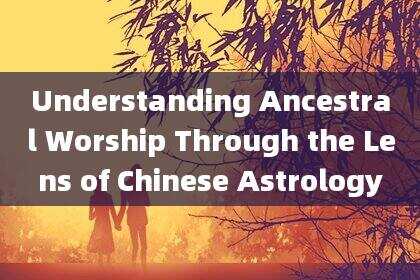
Ancestral worship, deeply rooted in Chinese tradition, reflects a profound respect for lineage and heritage. It serves as a bridge between past and present, embodying the belief that familial spirits continue to influence the living. This cultural practice is intricately tied to the principles of Chinese astrology, where the concept of fate and destiny plays a pivotal role.
In Chinese astrology, one's destiny is believed to be influenced by a combination of factors, prominently the year, month, day, and hour of birth. This system, based on a twelve-year cycle of animals and five elements, determines a person's character, strengths, and weaknesses. The alignment of these elements at birth is thought to shape not only an individual's life but also their interactions with ancestors.
Central to the practice of ancestral worship is the belief in the continuity of life beyond death. Ancestors are revered for their wisdom and guidance, with rituals designed to honor their spirits. These rituals often include offerings of food, incense, and prayers, seeking blessings and protection from the spiritual realm.
The Chinese zodiac, with its twelve animal signs, further enriches the understanding of ancestral dynamics. Each sign is associated with specific traits and attributes, influencing familial relationships and interactions. For instance, those born in the Year of the Rat are considered resourceful and adaptable, traits that may echo through generations.
Moreover, the concept of yin and yang, fundamental to Chinese philosophy, permeates ancestral worship practices. It emphasizes balance and harmony within the family unit and extends to the relationship between the living and the deceased. Offerings made during ceremonies are often symbolic representations of this balance, aiming to maintain familial cohesion and spiritual alignment.
Chinese astrology's influence on ancestral worship is profound in its depiction of generational dynamics. The interplay of astrological charts between ancestors and descendants is believed to shape familial destinies. Understanding these dynamics allows individuals to navigate their relationships with ancestors and seek their benevolence in daily life.
Through the lens of Chinese astrology, ancestral worship becomes not just a cultural practice but a cosmic dialogue between past and present. It underscores the interconnectedness of all generations and the enduring influence of familial bonds. Each ritual performed is an acknowledgment of this connection, reinforcing the continuity of traditions and values.
Furthermore, the practice of ancestral worship evolves alongside societal changes while retaining its core beliefs. Modern interpretations integrate technology and contemporary lifestyles without compromising the essence of honoring ancestors. This adaptability reflects the resilience of Chinese cultural heritage and its ability to resonate across diverse generations.
Ultimately, ancestral worship offers a profound insight into the intricate tapestry of Chinese culture and its enduring values. It provides a pathway to understanding the past while navigating the complexities of the present. By embracing the principles of Chinese astrology, individuals can cultivate a deeper appreciation for their familial roots and the spiritual guidance that shapes their lives.
In conclusion, the practice of ancestral worship, enriched by the principles of Chinese astrology, transcends time and space. It bridges the realms of the living and the departed, fostering continuity and reverence across generations. As individuals engage in rituals that honor their ancestors, they participate in a timeless tradition that celebrates the enduring legacy of familial bonds.
版权声明:xxxxxxxxx;


工作时间:8:00-18:00
客服电话
电子邮件
admin@qq.com
扫码二维码
获取最新动态
